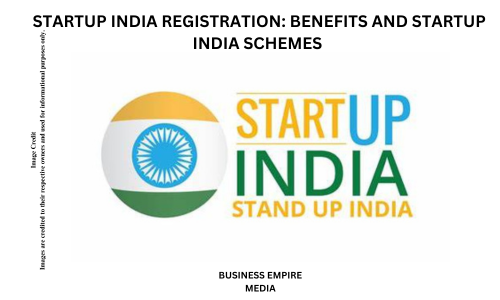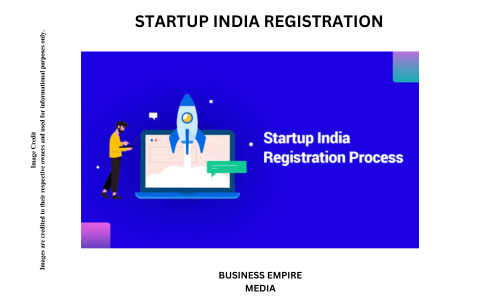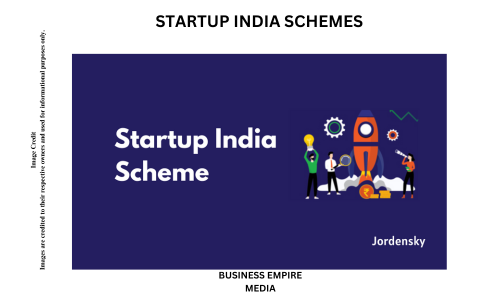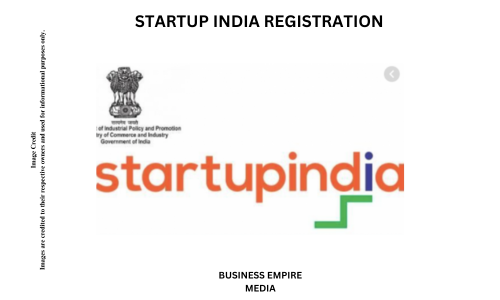Startup India is a flagship initiative of the Government of India, launched in January 2016, aimed at fostering entrepreneurship and innovation in the country. It provides a robust framework for startups to grow and flourish by offering various incentives, simplifications, and support systems. Whether you’re an aspiring entrepreneur or a seasoned business owner, understanding the registration process and benefits under the Startup India scheme can be a game-changer.
What is Startup India?

Startup India is a flagship initiative launched by the Government of India in January 2016 to promote entrepreneurship and innovation. The program aims to create a robust ecosystem for startups by providing them with various incentives, simplifying the registration process, and offering support systems like funding, tax exemptions, and intellectual property rights (IPR) assistance. By fostering innovation, the initiative seeks to drive economic growth, generate employment, and position India as a global startup hub. The program also emphasizes networking opportunities and streamlined compliance to help startups thrive in a competitive market.
Eligibility Criteria for Startup India Registration
1. Age of the Entity
The business should be newly established and must not be older than 10 years from the date of its incorporation. This ensures that only genuinely new and innovative ventures are eligible for the benefits under the Startup India initiative.
2. Type of Entity
To qualify, the business must be legally registered as a Private Limited Company, a Partnership Firm, or a Limited Liability Partnership (LLP). This registration is necessary to formalize the business structure and to comply with the regulations set by the government.
3. Annual Turnover
The company’s annual turnover should not exceed INR 100 crores in any financial year since its incorporation. This criterion ensures that the initiative benefits smaller businesses that are in the early stages of growth, rather than established large corporations.
4. Innovation and Scalability
The startup should be working towards innovation, development, or improvement of products, services, or processes. Alternatively, it should have a scalable business model with a high potential for wealth creation and employment. This ensures that the initiative supports businesses that contribute to the economy through innovation and growth.
5. Original Entity
The business must not be formed by splitting up or reconstructing an existing enterprise. This criterion is in place to ensure that only genuinely new startups, rather than restructured or rebranded older businesses, benefit from the program’s incentives.
How to Register Under Startup India

To register under Startup India, follow these steps:
- Incorporate Your Business: Begin by setting up your business as a Private Limited Company, Partnership Firm, or Limited Liability Partnership (LLP). Ensure that your business is legally established and compliant with relevant laws.
- Visit the Startup India Portal: Go to the Startup India website and create an account. This portal is the gateway for applying for recognition and accessing various startup benefits.
- Apply for Recognition: Fill out the application form for startup recognition on the portal. Provide details about your business, including its nature, products/services, and innovative aspects.
- Submit Documents: Upload necessary documents such as your business’s certificate of incorporation, a brief description of your products or services, and any relevant proof of innovation or scalability.
- Receive DPIIT Recognition: Once your application is reviewed and approved by the Department for Promotion of Industry and Internal Trade (DPIIT), you will receive a recognition certificate. This certificate is crucial for availing various benefits under the Startup India initiative.
- Apply for Additional Benefits: After receiving recognition, apply for various benefits such as tax exemptions, funding support, and IPR facilitation, as applicable.
Key Benefits of Startup India Registration
- Simplified Compliance
Enjoy streamlined regulatory procedures and a single-window clearance system, making it easier to meet legal requirements and focus on business growth. - Tax Exemptions
Benefit from income tax exemptions for three years, and relief from long-term capital gains and investments above fair market value, enhancing financial flexibility. - Funding Support
Access venture capital through a Fund of Funds with a corpus of INR 10,000 crores, and improved access to bank loans and credit facilities to support business expansion. - Intellectual Property Rights (IPR) Support
Receive fast-tracked patent applications, rebates on patent and trademark filings, and assistance from facilitators to protect and manage your intellectual property. - Government Tenders
Participate in government tenders without prior turnover or experience requirements, opening doors to significant contract opportunities and business growth. - Networking Opportunities
Engage in events, workshops, and seminars to connect with investors, mentors, and industry experts, fostering valuable business relationships and collaborations. - Self-Certification
Utilize self-certification for compliance with labor and environmental laws, reducing bureaucratic hurdles and facilitating smoother business operations. - Easier Exit Process
Benefit from a streamlined exit process under the Insolvency and Bankruptcy Code, 2016, allowing for quicker and more efficient business closures if needed. - Startup India Certificate
The Startup India Certificate is an official recognition granted by the Department for Promotion of Industry and Internal Trade (DPIIT) to businesses that meet the eligibility criteria under the Startup India initiative. This certificate validates the startup’s status and eligibility for various benefits provided by the program, including tax exemptions, funding support, and simplified compliance procedures.
- Partner Supports
Under the Startup India initiative, Partner Supports refer to the collaboration with various organizations, including industry experts, incubators, accelerators, and corporates, to provide startups with essential resources and guidance. These partners offer support in areas such as mentoring, networking, funding, legal advice, and market access.
Startup India Schemes:

- Fund of Funds for Startups (FFS)
- Launched by the government to provide funding support to startups.
- Managed by SIDBI (Small Industries Development Bank of India), this scheme allocates funds to SEBI-registered venture capital firms, which in turn invest in eligible startups.
- The corpus for this fund is INR 10,000 crores, aimed at fueling the growth of startups in various sectors.
- The objective is to bridge the funding gap and help startups access capital for scaling their operations.
- Startup India Seed Fund Scheme (SISFS)
- Provides financial assistance to startups at the seed stage, which is crucial for product development, proof of concept, prototype development, and market entry.
- The scheme has a corpus of INR 945 crores and offers up to INR 50 lakhs to eligible startups.
- Funds are disbursed through selected incubators across the country, ensuring that startups have access to the necessary support and resources.
- Credit Guarantee Scheme for Startups (CGSS)
- Offers collateral-free loans to startups, ensuring that lack of security doesn’t hinder access to funding.
- The scheme provides credit guarantees on loans up to INR 10 crores per eligible startup.
- This reduces the risk for lenders and encourages banks and financial institutions to provide loans to startups.
- It covers various sectors, making it easier for startups to secure the capital needed for growth.
- Self-Employment and Talent Utilization (SETU) Scheme
- Aims to support innovation and entrepreneurship in the country by creating an ecosystem that nurtures talent and provides access to incubation and acceleration programs.
- Provides seed funding, mentoring, and advisory services to early-stage startups.
- Encourages the development of technology-driven solutions to address societal challenges.
- Helps entrepreneurs in developing viable business models and scaling their ventures.
- Atal Innovation Mission (AIM)
- Established by NITI Aayog, AIM promotes innovation and entrepreneurship across India.
- Includes initiatives like Atal Incubation Centres (AICs) and Atal Tinkering Labs (ATLs) to foster a culture of innovation at both the startup and school levels.
- Provides grants, mentorship, and other support to startups and innovators.
- Focuses on solving major societal challenges through innovation, particularly in sectors like healthcare, agriculture, and education.
- Pradhan Mantri Mudra Yojana (PMMY)
- Facilitates micro-financing to small and micro-enterprises, including startups.
- Offers loans up to INR 10 lakhs under three categories: Shishu (up to INR 50,000), Kishore (INR 50,000 to INR 5 lakhs), and Tarun (INR 5 lakhs to INR 10 lakhs).
- Aims to empower startups with financial support to help them establish and grow their businesses.
- Accessible through banks, non-banking financial companies (NBFCs), and microfinance institutions (MFIs).
- Startup India Innovation Challenges
- Organized to encourage startups to develop innovative solutions to specific challenges across various sectors.
- Winners receive funding, incubation support, and access to markets to bring their solutions to scale.
- Helps identify and promote high-potential startups that can address pressing issues in areas like technology, healthcare, and environmental sustainability.
- Startup India Hub
- A one-stop digital platform that connects startups with investors, mentors, incubators, and other stakeholders in the ecosystem.
- Provides access to resources, tools, and government schemes tailored to the needs of startups.
- Offers networking opportunities and access to various programs and events that help startups grow and scale.
Disclaimer
The information provided in this blog is for general informational purposes only and is not intended to be a substitute for professional advice. While we strive to ensure that the content is accurate and up-to-date, we make no representations or warranties of any kind, express or implied, about the completeness, accuracy, reliability, suitability, or availability of the information contained herein. Readers are advised to consult with relevant professionals before making any decisions based on the content of this blog. We shall not be liable for any loss or damage arising directly or indirectly from the use of or reliance on this information.

